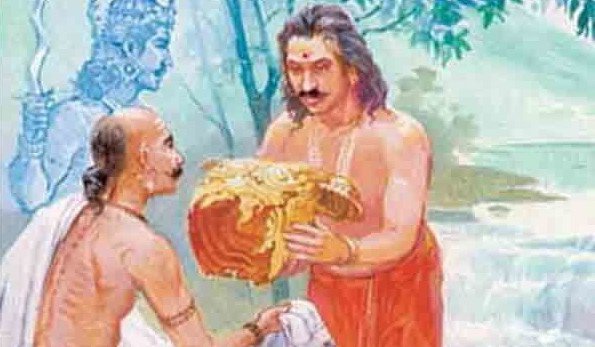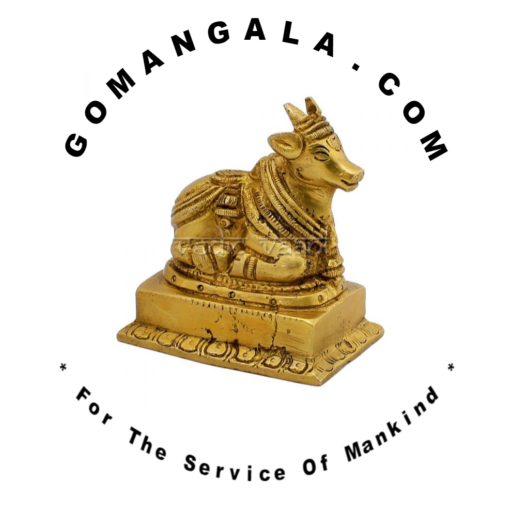Kundala Harina Parva is the forty third upa parva included in the third maha parva, named as Vana parva or Aranyaka parva in the epic Mahabharata. The original epic was composed by Vyasa in Sanskrit. Vyshampayana had narrated to Janamejaya the historical events that happened in the forests, on his queries.
What had been signified by the name of the upa parva as Kundala Harina?
The initial part of the upa parva narrates the story regarding the donation of ear ornaments, Karna Kunadala. The later part of the upa parva narrates the story regarding the appearance of a deer or harina, who was none other than Yama, the father of Yudhishtira, who had come to advise the Pandava brothers in disguise.
What had been advised to Karna by the Sun God in the form of a Brahmin and how Karna reacted to him in his dream?
When the Sun God appeared before Karna in his dreams, he had told his father that he would follow the rules of donations. If Indra appeared in the form of a Brahmin in disguise, he would donate his Kavacha and Kundalas to him unconditionally. But his father advised him to make a condition with Indra before giving his ear rings to him. He could ask a boon since the ear rings were the properties of Sun God and Karna could oblige his father’s words. As per his advice, Karna had decided to obtain the power to kill a strong warrior in the war after Kundala donations.

When and how the Kundala were donated by Karna?
After taking bath in the Bhagirathi River, Karna would be disbursing gold and cash to Brahmins who were poor in society and asked alms for life. One day, Indra had stood last in the queue of Brahmins for alms in the form of a learned Brahmin and asked for the Kavacha and Kundalas with Karna. It was noon and meal time. Karna tried to divert his demands but the Brahmin was pertinent to get his Kavacha and Kundalas only. Then he remembered the advance intimations of his father and agreed to donate them under the condition of the provision of a boon to him.
ततश्चित्वा कवचं दिव्यमंगात् । तथैवार्द्रं प्रददौ वासवाय ॥ तथोत्कृत्य प्रददौ कुण्डले ते । वैकर्तनः कर्मणा तेन कर्णः ॥
Meaning: Then Karna had cut the natural ear rings from his holy part of the body and as such in the wet status, donated it to the Indra, who appeared as a Brahmin, and by donating the Kavacha Kundalas, Karna had got his name and fame.
Hence Karna obtained his boon also. He would be able to kill a strong warrior in the war. There after, Karna was eager to face Arjuna in the battle.
How Pandavas and Kauravas reacted after the donation of Karna’s ear rings?
Yudhishtira and Pandava brothers felt happy to know about the donation of Karna’s ear rings. Duryodhana and Kaurava brothers felt unhappy to know about the donation of Karna’s ear rings.
Prior to the donation, how many times Karna had failed in the wars?
During the war at Goshayatra, near Dvaithavana, Karna was failed by Chaitraratha and Karna had run away from the war since he could not fight with him. Karna had failed in the war and Bhishma warned Duryodhana not to rely on Karna.
What were the additional benefits when Karna offered Indra his Karna Kundalas?
Karna received additional benefits after donating Karna Kundala to Indra. Even though he had cut his body parts, marked with sharp swords, there were no deforms, wounds or pains on his body. Since Indra of heaven had received donations from Karna, he had become famous and his name would be memorized on this Earth so long as Mahabharata story is read, heard or retold as a devotee of Krishna. The reader, the listener or the teller would also be deserving for his divine blessings.
What Yudhishtira had decided after returning of Bhima, Arjuna and Draupadi to the camp at Kamyakavana and why?
Yudhishtira had decided to move to Dvaitavana after recovery of Draupadi from the hands of Jayadratha. Then Bhima, Arjuna, Dhaumya Rishi and others had returned to the camp. Yudhishtira had calculated the time elapsed already exhausted in exile in forests and the balance period to be lived under Ajnathavasa. He wished to spend a few days in Dvaithavana preparing for the Ajnathsavasa.
What happened to the five pandava brothers in the Dvaitavana before Ajnathavasa?
When Yudhishtira and his companions had reached Dvaitavana, one of the Brahmins had put his hand bag hanging on the side of a tree, and then sat on the ground near the natural water tank called Dvaitavana Sarovara. One harina or forest deer was seen rubbing its horns and body to the trunk of that tree and then the hand bag of the Brahmin had gripped into the long horn branches of the deer.
When the Brahmin went near the deer to catch his hand bag, the deer started to run away and the old man helplessly complained to Yudhishtira to help him in collecting it back.
Then Yudhishtira had become sympathetic, hence ran behind it and found the deer had gone out of his sight. So he ordered to his four brothers to chase the deer and catch the bag. All the five Pandava brothers were tired in the dense forest when they had chased the deer. They sat together under a banyan tree after a long running. In order to get rid of the fatigue, they started friendly discussions.
Pandavas had suffered for twelve years during their exile in the various forest camps. Bhima told he should have killed Duryodhana on the day of the dice game. Then Arjuna told he should have killed Karna on the day of the dice game. Sahadeva had told he should have killed Shakuni on the day of the dice game. Since they were thirsty and needed water, Yudhishtira told Nakula to climb a tree and look around for the proximity of any source of water or any symptoms of trees that would grow depending on the water source.
Nakula heard the sound of swans and guessed the existence of water. He went there with a pot in hand and thought to bring water. Then he had seen some swans and a natural water tank. When Nakula had taken some water with his open hand bowl to drink, he was suddenly warned by a sound. It warned and desired to question him as if a quiz. After answering that question, he could drink or carry as much water as he desired. Due to thirst, he had not heeded its warning and tried to drink and fell unconscious.
After sometime, Yudhistira had thought Nakula would be delayed and he deputed Sahadeva to bring both Nakula and water. Hence Sahadeva had started to bring water from that spot. He reached near the tank. The cranes or the swans were sitting around near the tank beautifully but due to thirst, Sahadeva could not think of any aesthetic enjoyments.
When Sahadeva had taken some water with his open hand bowl to drink, he was suddenly warned by a sound. It warned and desired to question him. After answering that question, he could drink or carry as much water as he desired. Due to thirst, he had not heeded its warning and tried to drink and fell unconscious. After sometime, Yudhistira had successively deputed Arjuna and Bhima and their fate was similar to Nakula and Sahadeva.
When Yudhishtira had observed the failure of all his four brothers in procuring water, he started himself in the same direction. As he had taken some water with his open hand bowl to drink, he was suddenly warned by a sound. It warned and desired to question him. After answering that question, he could drink or carry as much as water as he desired. Yudhishtira had looked around the tank. He had seen his four brothers were lying near the cranes. He judged that, due to thirst they would not had heeded the warning and tried to drink and fell unconscious.
Yudhishtira had thought it would be some ascetic power or some supernatural body governing the tank and water there. He told loudly his name as Yudhishtira and desired to drink water and if he could ask his questions, he would be trying his best to satisfy him with his answers. Hence waited, he told to ask first and he abandoned drinking that water preparing to answer that voice of Yaksha.
Yudhishtira had decided to give satisfactory answers to the questions, drink water later and then go for searching the harina to recover the bag of the Brahmin. The questions were of very high standards, and the answers were of very high ancient intellectual levels and the session was known as Yakshaprashna.
On reading this story, children would gain more memory power.
Next post, Mahabharat: Yakshapashna would be more interesting.
Mahabharat: Ajnatavasa Pravesha would be presented separately in another article.
It is humbly prayed for the blessings of God Krishna upon us.
Readers may share this story with children, friends and family.

0 Comments
1 Pingback